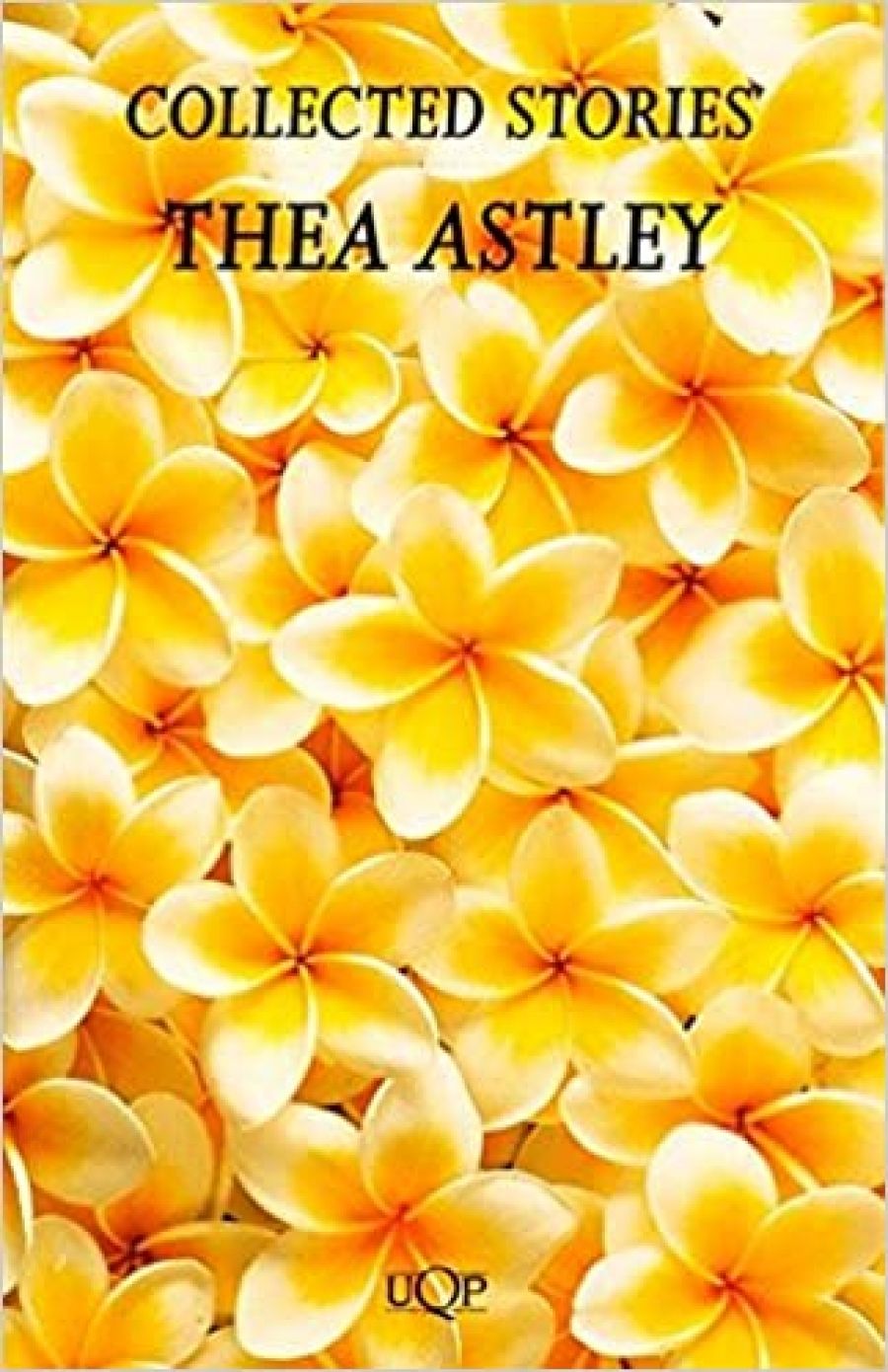
- Free Article: No
- Contents Category: Short Stories
- Review Article: Yes
- Online Only: No
- Custom Highlight Text:
One of the principal characters in much of Thea Astley’s writing is Queensland. ‘An intransigent fecundity dominated two shacks which were cringing beneath banana clumps, passion-vines, granadillas.’ There’s a lot of sad poetry about the place; and the distances that separate us, I mean the physical distances, are like verse-breaks in a ballad; and once, once we believed the ballad might never end but go on accumulating its chapters of epic while the refrain, the almost unwordable quality that mortises us together, retained its singular soul. How express the tears of search?
Tears, sadness, and poetry run deeply and powerfully through this collection, in counterpoint to wit, satire and the fantastic Astley prose. Nothing is sacred save beauty and the human heart, and to track her way to these holy places, the writer, alert with a sure-fire and deadly language, creates character, situation and dialogue which are at once vivid, poignant and unforgettable.
The collection of twenty-seven stories is divided into four parts – early, uncollected stories, a selection from Hunting the Wild Pineapple, a selection from It’s Raining in Mango and a number of later uncollected pieces. One thing I regret here is that some of the stories from the two published collections have been omitted. One of my favourites ‘Write me, son, write me’ is, alas, among the missing ones. In, sense this book is not the collected stories, but the selected stories.
But another great favourite ‘A Northern Belle’ is here. This is one of the most potent, moving, tragic stories I know. The structure is a marvel. I always weep at the end.
It is tempting to compare the earliest story ‘Cubby’ with the most recent one ‘A Diesel Epiphany’. In both the country is the human heart, but in ‘Cubby’ the plot has a round simplicity, and the prose is smooth and lyrical, whereas by the time you get to ‘A Diesel Epiphany’ the events of every day have developed an exquisite surrealism, and the structure and syntax have taken on a fine and deadly edge.
There’s a touch of the nurse, the prefect, despite the Indian smockery. Her clothing looks – well –dedicated. Her cosmetic free face on which the freckles stand out like a sunny days punctuation is serious and purposeful. You know she’ll be into vegetables trees meditation bananas guitars folk and therapeutic sex.
Hippies get a very bad press in these stories. Dropouts called Shark and Groper and Flute with their pot, in search of themselves, taking a breather from post-graduate degrees, relying on the dole and cheques from home. They are funny and silly and thieving and dangerous.
Thea Astley has always had an eye and an ear for bullshit and its corrupting effects, and as you read these stories you can track her subtle as well as her full-on aim at the crap factor in modern life. There’s a character who measures distances by the number of drinks you can have in the air. ‘It’s two beers from Brissy to Townsville, and then one more to the Top.’ ‘There are no humans left. Only real estate agents’ who ‘leave great noxious deposits of high-rise which they have to sell to each other.’ Mail and bread and Courvoisier and toilet paper get flown in to outlying places. ‘Beside the abandoned brickworks an old cement-mixer is covering itself with vines.’
The land and the vegetation are treacherous and beautiful. Rain becomes teeth as it attacks the steps to the house; water-lilies clot the lagoon. People are vulnerable, cruel, lost, sometimes redeemed.
Music and language are constants, reliable keys to the beauty and goodness of the human heart. Time and again the characters in these stories turn to music and song in their aspiration to a spiritual meaning. (In ‘Ladies Need Only Apply’, a shocking, confrontational story, the music is cracked, dissonant, part of the disease.) But ‘A Diesel Epiphany’ and its companion ‘Why I Wrote a Story Called “Diesel Epiphany”‘ both celebrate in a surreal and abundant manner the importance of music in human life. There is a sanity that comes with music, a clarity and a cleanliness. The woman who can not take in the music in ‘A Diesel Epiphany’ spits out words as if ‘all the filth she has ever experienced has gathered in her mouth as she vomits out those words.’ The narrator of the story opens up to the music and ends with: ‘I tell you, it’s made, not my day, but my week month year, maybe my life.’
There is a strange, idiosyncratic hymnal quality to the writing, and with this and the sharpness of vision and the juxtaposition of sacred and profane, these stories reverberate with a depth of compassion and hum with a weird tropical beauty that is tantalising and unforgettable. Hunting, searching – these are motifs of the collection. ‘How express the tears of search?’ In words and music, words and music. Character, dialogue, words, music. And quite a marvellous vision and a distinctly spiritual point of view.


Comments powered by CComment